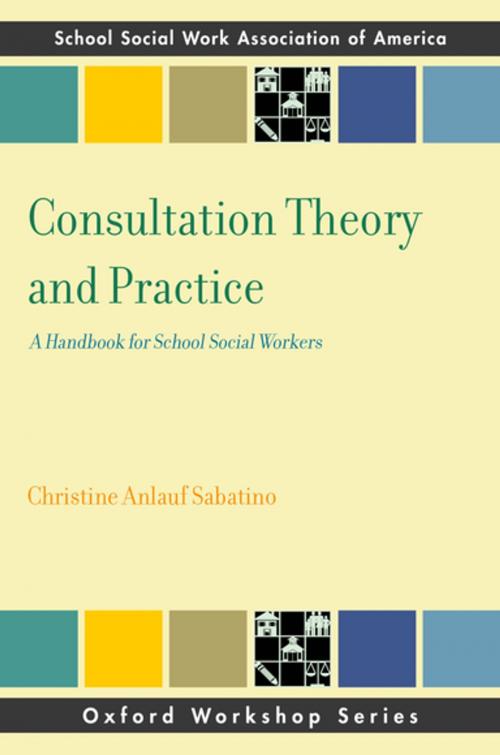Consultation Theory and Practice
A Handbook for School Social Workers
Nonfiction, Social & Cultural Studies, Social Science, Social Work| Author: | Christine Anlauf Sabatino | ISBN: | 9780199395873 |
| Publisher: | Oxford University Press | Publication: | March 28, 2014 |
| Imprint: | Oxford University Press | Language: | English |
| Author: | Christine Anlauf Sabatino |
| ISBN: | 9780199395873 |
| Publisher: | Oxford University Press |
| Publication: | March 28, 2014 |
| Imprint: | Oxford University Press |
| Language: | English |
School social workers engage in different forms of consultation on a daily basis, yet they rarely think about or describe this work as 'consultation.' Further, school social work practice research finds that consultation is among the most frequently performed practice tasks, yet consultation is rarely defined in school social work literature or research. This book adapts the consultation theory and practice framework put forward by June Gallessich (1982) that defines consultation in specific terms and proposes that there are six models of consultation. These models are organizational consultation, program consultation, education and training consultation, mental health consultation, behavioral consultation, and clinical case consultation. The models are differentiated according to their problem focus, outcome goal, intervention methods, change processes, power base, and value system. School social work consultation services are an important pathway to help school systems fulfill their educational mission and to help school personnel become more effective in their professional work. It is consistent with current trends in educational policy that call upon school social workers to take a multisystem approach to addressing school needs on a school-wide, class-wide, or individual level. The overarching goal of the book is to provide school social workers with the knowledge, skill, and confidence to implement consultation services. Consultation is a powerful method to 'realize the promise of the whole-school approach' and to help homes, schools, and communities foster school success and student well-being.
School social workers engage in different forms of consultation on a daily basis, yet they rarely think about or describe this work as 'consultation.' Further, school social work practice research finds that consultation is among the most frequently performed practice tasks, yet consultation is rarely defined in school social work literature or research. This book adapts the consultation theory and practice framework put forward by June Gallessich (1982) that defines consultation in specific terms and proposes that there are six models of consultation. These models are organizational consultation, program consultation, education and training consultation, mental health consultation, behavioral consultation, and clinical case consultation. The models are differentiated according to their problem focus, outcome goal, intervention methods, change processes, power base, and value system. School social work consultation services are an important pathway to help school systems fulfill their educational mission and to help school personnel become more effective in their professional work. It is consistent with current trends in educational policy that call upon school social workers to take a multisystem approach to addressing school needs on a school-wide, class-wide, or individual level. The overarching goal of the book is to provide school social workers with the knowledge, skill, and confidence to implement consultation services. Consultation is a powerful method to 'realize the promise of the whole-school approach' and to help homes, schools, and communities foster school success and student well-being.















